#janeway knows!!! and janeway as a character is also a much more integrated person along her fault lines and contradictions
Explore tagged Tumblr posts
Text
#going back here to say that it is Really crazy#and mulgrew seeing the script and going: bet#watching the episode and discovering what the premise was A Trip in itself#janeway alreadyd did this so like resigning from starfleet if they didnt accept seven was completely Nothing @moonhuit
Sometimes I still can’t believe that “Endgame” was so overtly J7 and have to bang out a few hundred words why; or, in which I feel strongly that the series finale of Voyager might as well have been called “Seven of Nine Is Going to Die” and this is why.
The script gives such emphasis to Admiral Janeway’s preoccupation with and trauma surrounding her Seven’s death, especially in comparison to her grief over Chakotay’s death and Tuvok’s degenerative illness. She desires to save them also, yes! Of course! She loves and misses them too! I would never argue otherwise!
However.
Seven is repeatedly bucketed into a very different category than Tuvok and Chakotay, who are likewise repeatedly bucketed together into the same category, in line and in frame. See for reference:
Admiral Janeway talking with sorrow, but fairly easily, about Chakotay and Tuvok before the time jump, vs. her almost inability to even mention Seven’s name (I’d… prefer not to discuss Seven of Nine.)
Admiral Janeway beaming aboard Voyager and fondly taking in the sight of Tuvok and Chakotay standing together in one frame vs. Admiral Janeway leaping off her biobed when Seven of Nine walks in, staring intensely and hungrily at her for the length of an entire scene
Admiral Janeway working with Tuvok and Chakotay on either side of her on the bridge in a fucking voiceover montage vs. Admiral Janeway tracking down Seven and exhorting her in the rawest voice you personally have ever heard to think about “people who love you” re: avoiding Seven’s future death
Admiral Janeway cutting off lines and lines and lines and lines and lines of Captain Janeway’s anger and determined idealistic optimism with a single phrase: “Seven of Nine is going to die.” Captain Janeway’s attention thusly grabbed, Admiral Janeway then reveals Tuvok’s illness. She says nothing about Chakotay aside from “He’s never the same after Seven’s death - and neither are you.”
This is JUST BARELY still in the subtext at this point, and only by the bludgeoning force of the emotionally nonsensical Chakotay/Seven scenes that are dropped around them to heteronorm up the episodes. None of them matter, because even their slap-in-the-face absurdity can’t detract from the power of the real emotional thread of the finale:
Seven of Nine Is Going to Die.
This is the turning point of the entire finale, the moment when Captain Janeway and Admiral Janeway find common ground. Admiral Janeway has gambled everything on being able to travel to the past and say these exact words to her younger self, knowing the effect they would have. And guess what? She was fucking right.
The entirety of the rest of the plot turns on this moment, and I’m absolutely not exaggerating when I say this. It’s around this point that Captain Janeway starts taking Admiral Janeway seriously and begins to not only trust her and ground her assistance in that trust, but also try to understand her - which, after an entire episode where Captain Janeway has been running on stubborn disbelief and rejection of this vision of who she is quite capable of becoming, is almost the more miraculous turning point.
And why? Because Seven of Nine Is Going to Die. That’s the consequence of not doing so. And if there’s one thing - one thing - that all versions of Janeway can agree on, it’s that Seven of Nine’s death is unacceptable. And for a finale that is very nearly a referendum on the constancy of Janeway’s character, that’s saying a hell of a lot.
#lois. lois.#lois do u know the lightbulb that went on in my head at your last tag.#bc of COURSE#seven is focused on the here and now; the what is rather than the what could be; especially - crucially - when it comes to rationalizing#her prioritization of the 'real' versions of the people she loves#she was like this with admiral janeway and her unhinged exhortations that seven prevent the future that janeway'd already lived through#'think about PEOPLE WHO LOVE YOU'#(girl seven can't even fucking look you in the eye maybe take it down a notch)#it was convenient for seven to be able to compartmentalize her away#but i feel like... it's just a surprise that will (not help) her later#maybe the specific later date of her own janeway blithely being like yeah i told them if they didn't accept you i'd resign#bc this is HER janeway#the stakes and consequences are different#she can't compartmentalize this away#and her janeway does already know the lengths she'll go to for seven#'seven of nine is going to die' - cutting off all her idealism at the knees#before that - taking on the borg queen; flirting with killing someone else to save seven; getting ASSIMILATED - 3 separate occasions#batshit INSANE occasions#only one time of which she was talked down from#janeway knows!!! and janeway as a character is also a much more integrated person along her fault lines and contradictions#in a way seven only becomes offscreen - sort of - in the time between voyager and picard#they are just never on the same page about the big things even when they take for granted that they are#which leads to things like (look i'm convinced i'm right about the impetus) seven running away scared for twenty years bc it was all Too Bi#janeway was too big; seven couldn't comprehend her#anyway yeah tl;dr lois ur right as usual#voyager#my meta
320 notes
·
View notes
Text
Beta Cannon: the Pre Voyager Era of Kathryn Janeway | Mosaic v The Autobiography of Kathryn Janeway
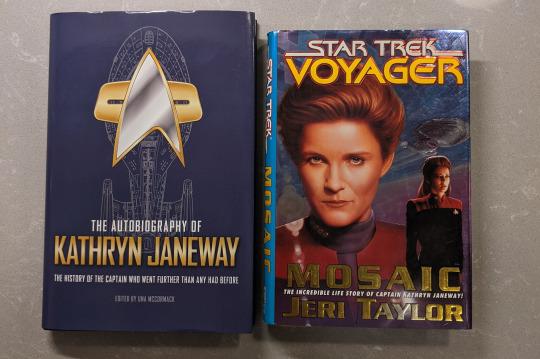
This weekend, I got a copy of the Autobiography of Kathryn Janeway from a local book store. For how frequently we speak about Mosaic in the community (despite having some flaws) I was shocked that I had not heard a lot about this book and assumed it was a bad thing. And yeah in some regards it was (see @mia-cooper’s post on the subject). I have a lot of feelings (I’ll post a proper review at a later point) but one thing that did stick out to me is the divergence from what we have considered Beta Canon, aka, the extended universe of Star Treks told through novels, short stories, video games, etc. After completing the novel, I jumped right into my old standby copy of Mosaic, which has dictated a lot of Janeway’s back story since 96. Both of these novels cover the beginnings of Janeway’s life and how she was shaped into the woman we know.
TLDR The Autobiography of Kathryn Janeway changes a lot of things for no reason. Some of these are for the good. Some for the bad. And some, for like no good reason at all, like it was fine as it was, and was accepted cannon for like 25 years, but sure fine whatever.
I will mention that, as Mosaic has been a book in my library and I have read it too many times, so of course, I do have a bias toward it. Additionally, I feel like it is fair to mention here that authors of Fanfiction have leaned on this as their bibles since 1996 as Mosaic is written by Jeri Taylor, one of the show-runners for Voyager. Because of its connection with a showrunner, Mosaic is also integrated into the canon of the show. It seems that most points that are taken from Mosaic in the Autobiography are only included because of their existence in cannon material.
Anyway, this review is going to focus on the characters that shape Kathryn and I will end with my final thoughts. This is long so to respect your dash, you are going to have to click keep reading. You’re welcome.
Obligatory Spoiler Warning for ALL of Mosaic, chapter 13 of Pathways, and chapters 1-7 of The Autobiography of Kathryn Janeway
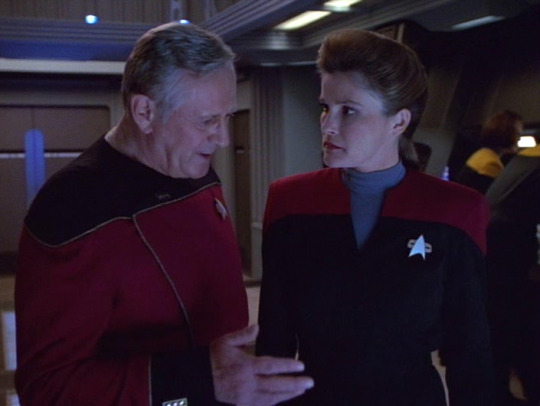
Edward Janeway
In all media, I feel like we can safely say that Kathryn Janeway is in fact a daddy’s girl. Her relationship with her father is very important to her, so it is interesting to see how it is portrayed very differently in both novels. In Mosaic, a lot of the highlights of Janeway’s earlier years revolve around time spent with him. From giving her special attention after ‘Your Sister’ was born, to consoling her after her losing tennis match and subsequent walk home in the rain, and trips to Mars, Kathryn mentions great fondness of quality time spent. In the Autobiography of Kathryn Janeway he is more described as an absent father, one that she always wanted to see and please. When he was home, she wanted all of his attention and to impress him greatly. She wished to follow in his footsteps after gaining a love of flight and the stars with a plane ride and a telescope he gave her. He tried to prepare her by detaining the events of the current conflict with Cardassia and inviting Starfleet brass over for dinner. Overall, in her early childhood, it makes more sense for Edward to not be around often. There is not a lot of conflict between the sources, other than the details of the aforementioned tennis match and different childhood nicknames.
Edward is in a crash aboard an experimental ship on Tau Ceti Prime which leads to his death. This is where the big differences begin. In Mosaic, Kathryn and her fiancé are also on board. In Autobiography of Kathryn Janeway, Kathryn is still on the Al-Batani. The fall out of this event has a great effect on Kathryn of course in both novels. As this is a missive shaping event of Kathryn’s life, I felt it very jarring to be changed. This moment shaped Janeway and gives us good context for why she handles situations the way she does. I see this trauma and I understand her character better, for dealing with the loss of two of the most important people in her life all at once.
Gretchen Janeway
The Autobiography of Kathryn Janeway was good to Gretchen Janeway as her character is basically a blank slate. We know little about her from Mosaic as it mostly focuses on Kathryn’s relationship with her father (and other male influences in her life). It is nice to learn more things about Grechen as with Edward’s job, it is likely that Kathryn was mainly raised by her. Other than being an artist, she also wrote some of the Flotter holos and wrote a number of children’s stories about the people of Bajor during the occupation. She does a lot of humanitarian work with the refugees from Bajor during the occupation. She loves to garden and get her daughters involved. She has a close bond with Phoebe due to their overlapping interests, but you can tell that she strives to support her in what she does. Overall, I like getting know Gretchen to be someone of than Kathryn’s mother.
Phoebe Janeway
I was shocked when researching Memory Alpha for this review, Phoebe is never named in any Cannon media up to this point (Star Trek Prodigy could very well change this). We know Janeway has a sister and she is an artist, but that is it. Both novels keep her very similar personality-wise. In both stories, Kathryn is not looking forward to being a big sister. They also both mourn the loss of their father together. In Mosaic, she is not mentioned much. Kathryn tells her she is not old enough on an off planet trip and Phoebe plays pranks on her. The Autobiography of Kathryn Janeway goes much more into depth. They don’t get along when they are younger. They fight a lot. I feel this is a very realistic portrayal of real siblings, vying for attention and approval, snapping when they don’t get their way. They both excel at what they do, Kathryn in her studies and Phoebe through her art. They seem to need to one-up each other at every turn. As they grow up, they grow closer together, as many siblings do. Points added for giving Phoebe a wife, something which has been included in a lot of fanfiction. Overall, there are no big conflicting points.
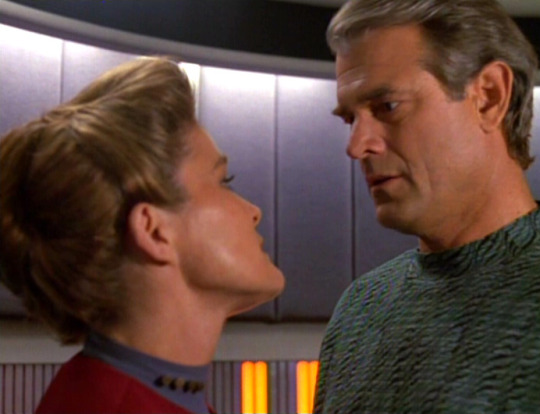
Mark Johnson
Kathryn’s fiance at the time of the Voyager’s disappearance, Mark is a very different part of Kathryn’s life in both novels. In Mosaic, he is a childhood friend and went by his middle name Hobbs. Seemingly always two steps behind Kathryn, he did a lot of the same activities that she did, tennis and swimming in the underground cave systems. He did these poorly, and this makes Kathryn always look down upon him. They reconnected after her father’s death and she fell head-over-heels for him. Personally, I always felt this was a little uncharacteristic of Kathryn, to run away from her responsibilities to be with a man. It just seems very out of character and has always bothered me. The Autobiography of Kathryn Janeway takes a completely different approach. She meets Mark as a friend of Pheobe and her wife as a widower. They hit it off and they fall hard. You can see the conflict in Kathryn as she debates how to move forward with a relationship as they have different outlooks on life. She has a drive to explore but does not want to be an absent parent. She debates quitting, which I don’t think is something Janeway would have ever done. Overall she decides to accept Mark’s proposal just before taking command of Voyager. This makes the Dear John situation a lot more believable as it makes sense that he would want to move on with his life much quicker. Overall, I have to just ask, why? I know Mark doesn’t have a lot of character, but why change basically their whole relationship dynamic?
Justin Tighe
Justin is a character I actually like for selfish reasons. This explains why I was very miffed that he was nowhere to be seen in the Autobiography of Kathryn Janeway. Justin is Kathryn’s first love, they were coworkers, engaged and in love, and dies in the same accident that takes her father. As a person who always wanted Chakotay and Janeway to get together, this incident perfectly gives the reason. She is afraid to get romantically involved with a crew member because of the nature of the job. This dynamic is seen between Picard and Nella Daren in TNG very well. Kathryn has learned the hard way that she can lose a person under her command and how it feels when you are in love with that person. In early Voyager, you can see she isolates herself from the crew and it takes time for her to get comfortable. And during Night she relapses to her old ways. This is the way I have always justified Janeway’s reluctance to have a romantic relationship during their time in the Delta Quadrant. By understanding her background, I have a lot of respect for that choice. Her relationship with Justin really shaped how she handles relationships and without the impact he had on her life, it actually makes her character weaker.
Owen Paris
Owen is Kathryn’s mentor. In Mosaic, they meet as he is reviewing her junior honors thesis advisor on massive compact halo objects. From here they gained a relationship built on respect and learning. It makes sense that, as he was her personal mentor, that she would be close with his family, and why she would seek out Tom as a person to bring with her to the Badlands mission. In the Autobiography of Kathryn Janeway, she does not meet him until she is on the Al-Batani. This doesn’t only weaken her relationship with Admiral Paris, but moreover weakens her relationship with Tom. If he was her superior officer, why would she develop such a ‘big sister’ mentality to Tom if she didn’t have as many opportunities to meet him?

Tuvok
Mosaic does not go too much in depth with Tuvok and Janeway’s relationship, but its sister novel Pathways does. In Pathways, Tuvok meets Janeway when he is an ensign under her command of the USS Bonestell. The Bonestell and the Billings, two ships that Janeway served on, tend to get confused a lot. Most sources have Janeway’s first command as the Voyager, Including Voyager itself - “It doesn't seem like my first command is shaping up the way I expected,” Janeway Shattered. The Autobiography of Kathryn Janeway has her and Tuvok meet on the Al-Batani. I actually really like the dynamic between them, as they grow to respect each other over a much longer period of time. I also like that, though Janeway climbs through the ranks, it does not change their relationship dynamic as she still relies on him and asks him advice as if they were equals. I think giving them a longer time to build their relationship. Also would like to note that Janeway and Tuvok also had a friendship with the original CMO of Voyager, Dr. Fitzgerald. I always wanted to know more about the Pre-Caretaker crew and I would have loved to see this dynamic and how the grief of losing a close personal friend in the Caretaker incident would impact them both.
Also I feel obligated to shout out the Janeway and Tuvok story in Star Trek Waypoint One-Shot. I need to get around to doing a series retrospective, but this short story I have not seen anyone talk about and I love it so much. Please read Waypoint. Okay next.
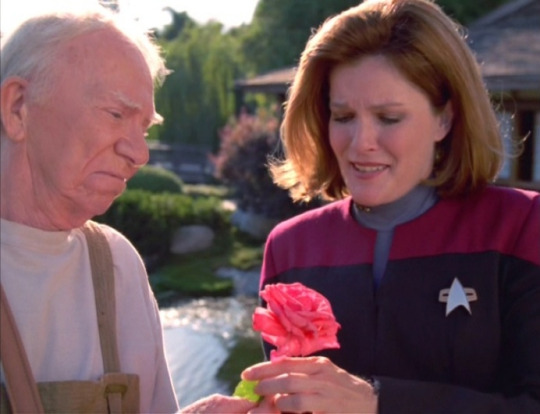
Other characters
Cheb - Janeway’s boyfriend in Mosaic. He was kind of an asshole and got her into trouble. He is not in the Autobiography of Kathryn Janeway and I see no problem with this.
Boothby - “[he is the] head groundskeeper at Starfleet Academy. When I was a cadet, he used to give me fresh roses for my quarters,” Janeway Revulsion. Boothby is not in Mosaic. In the Autobiography of Kathryn Janeway, it is explained that her mother loved to garden and this was something that Boothby did as a gradian figure to make her feel at home and destress. Makes sense.
Aisha - A childhood friend of Katheryn’s. Only in the Autobiography of Kathryn Janeway. Mosaic has this weird thing about highlighting the relationships with only the men in her life, so it is nice to see her have some other female friends.
Nexa - Katheryn’s roommate at the Academy. Only in the Autobiography of Kathryn Janeway. Nexa helps broaden Kathryn’s horizons by helping to learn about Exoliguisticts, first contact, and the Betazoid culture. Again nice to see her have other female friends.
Riker - Yes they go on a date in Mosaic. He is not mentioned in the Autobiography of Kathryn Janeway. I know he is a gag character but I still liked it.
-----------------------
Final Thoughts
A lot of characters were changed between these two novels. There is a lot to like and a lot to hate. I really like what the Autobiography of Kathryn Janeway did with characters like Tuvok and Gretchen Janeway. Other characters were not so lucky (Justin, sweetie I’m so sorry that they would erase you like that, oh my god). It’s a mixed bag, but one thing I need say is... why?
We have had a good thing going here with the established canon as is. Mosaic (and Pathways) is the foundation of which the last 25 years of fanworks and the relaunch novels are based on. Why change history when it is already written?
Always, would love to hear your thoughts and thank you for reading my novel of a post. I will see you in the full review.
#star trek#star trek voyager#kathryn janeway#janeway#voyager#voyager book club#star trek novel#the autobiography of kathryn janeway
57 notes
·
View notes
Photo
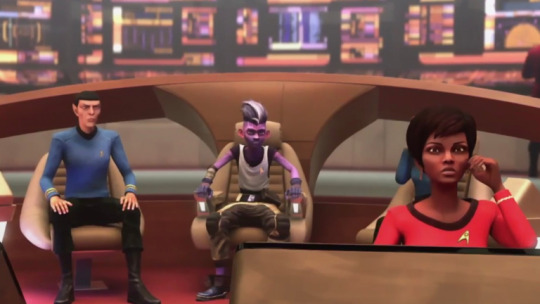
Star Trek Prodigy: Kobayashi
Summary: Dal tries to beat the Kobayashi Maru test while the others uncover a new mystery.
Comments: Welp, this was absolutely awful for me, but lemme at least talk about the positives first.
I like that Gwyn sulks around Sick Bay despite being physically sound. Showing repercussions from her father’s betrayal for a little continuity is nice and makes her integration/acceptance into the crew more believable.
I also enjoyed the new elements to the overall mystery. In this episode, we learn that the Protostar was previously captained by Captain Chakotay. Holo!Janeway does not have access to parts of her database because they’re encrypted in a language that only Gwyn and her father would know. That’s... weird and throws a new wrench into some previously formed theories. I’ve made enough guesses, so for now I’m just gonna go along for the ride. I just hope all these mysteries are resolved to satisfaction and there’s a rewarding payoff by the end.
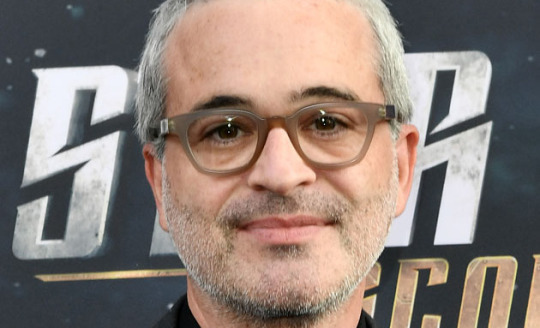
Okay, okay, that’s fair, I should know better, but I can at least hope, can’t I?
All right, so let’s talk about Dal and that Kobayashi Maru nonsense, shall we? Dal finds the holodeck and uses it to take the Kobayashi Maru test (from The Wrath of Khan). Without knowing it’s a no-win scenario, Dal obsessively retakes the test trying different approaches. This joke was already done on Lower Decks (Boimler’s Borg simulation), where it was much funnier, better executed, and made a lot more sense in the context of Boimler’s character, but we get it again here.
As an aside, the sound editing and dialogue in the Kobayashi sequence were absolutely atrocious. I worry sometimes that I overuse exaggerated vocabulary to the point of being unable to convincingly express when something is truly very poorly done, but the sound quality and forced dialogue was abhorrent and awful. They seem to have just taken unedited sound clips from original episodes and put them into the show with surrounding dialogue that made them seem clearly out of place. I mean, you could literally hear the static and background noises when they spoke!
Anyways, my main point is that using source material without understanding it is embarrassing and uncomfortable. The Wrath of Khan is a story about growing old, past one’s prime, and about Kirk confronting a no-win scenario—something he’s never had to deal with. It is not a story about starships shooting lasers at each other or any of the other things that visually happen on screen. The Kobayashi Maru is not “a test that Starfleet captains must take”—it’s just a narrative tool, created specifically for Kirk’s character development. It is a storytelling device used to illustrate that Kirk would rather alter the test’s parameters (i.e., cheat) than admit defeat or face a no-win scenario. It could have just as easily been another test, or not even a test at all and it could have fulfilled the same character function.
So why is Kirk’s narrative tool being applied to Dal? Is Dal growing past his prime, worried about growing old? Does Dal’s character struggle with confronting defeat? Do the writers understand the source material at all? There’s no rule saying you must faithfully recreate source material when you copy it; but using it without understanding it is amateurish and embarrassing. Besides, why not test Dal with a method that’s unique to Prodigy and/or to Dal himself? Why not create unique, memorable content?
Also, certain segments of the Star Trek fandom place value on the moral lessons and messages to be derived from the stories in the franchise. They find value in the idea that—at the very least—Star Trek should take itself seriously and present a message that resonates with any thinking person. To not do that—to take the phasers and the warp drive and the transporter and all the familiar visual trappings of “Star Trek” and use them as they are (not as tools to tell a meaningful story, but as a ends in and of themselves)—is to ignore the very core of what makes Star Trek Star Trek. It takes those familiar elements and uses them to reduce Star Trek to mockery, an object of ridicule to be laughed at.
Star Trek Prodigy has been enjoyable thus far as a kids action show. Its strengths lie in that direction. There’s little reason to disgracefully shovel fan-service garbage onto the screen under the guise of introducing children to “Star Trek.”
My enjoyment: 0/5
10 notes
·
View notes
Text
Star Trek: Voyager
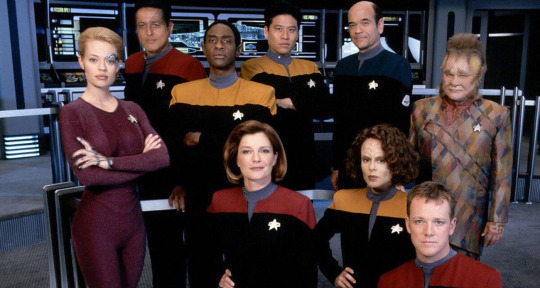
Yes this show ended some time ago; that doesn’t mean that it’s not still underrated.
A relative late convert to Star Trek, this author committed to traversing the Delta Quadrant having finished The Original Series, The Next Generation, Discovery & Picard to date. Deep Space Nine is next; like the Doctor I don’t know anything about this ‘Dominion’ but they seem important and we’ll get there.
Having now finished Voyager, here’s the (spoiler-filled) thoughts of someone who came to the bridge afresh and savoured the light-hearted nature of the show. Yes TNG demanded more attention and the episodes herein that do are generally better, but for relaxed, semi-serialised adventure Voyager is a high point.
We’ll start with the negative and get to the fun stuff.
From the get-go there was a jarring disconnect between the premise and goals of the show. If a ship more advanced than any in the region is travelling really fast in one direction they’re not going to keep running into the same people; better begetting a saga poised for episodic rather than serialised fiction. The writers and audience were evidently a little tired at this point of TNG’s slavish devotion to wrapping everything up in 40-odd minutes so wanted to try variations on a theme; it was the right approach for the time accompanied by a smart premise that didn’t match.
And a stellar premise it was only set to be buoyed by the Federation-Marquis dynamic. Also partly squandered, corresponding grounds for strong tension and stories were left by the wayside – characterised by Chakotay’s ill-established, apparently immediate and seemingly endless trust in Janeway; together major failings of the show.
On continuity, and just so it’s out of the way; no they don’t show it but it’s clear the crew just manufactured more photon torpedoes like they did so much else.
Commencing with one of the best episodes, there is rarely a subsequent moment as character-defining as Janeway destroying the array. Don’t get me wrong, Kate Mulgrew is great, but she alike Kirk and Picard are, as fleshed out as they become, for stretches bare variations on a tired theme; young headstrong hotshot dedicates their life to the stars to become a reasoned, seasoned Commander. ‘Tapestry’ did it best and there was no need to explore this further.
Voyager had a general problem with characters that took several seasons to grow; it was a long time before Neelix stopped being grating and his earnestness became endearing. There is too very little you can relay about Tuvak beyond his being a Vulcan and a little sardonic, or Harry besides his yearning for advancement or Chakotay aside his membership of the Marquis and focus on his cultural background.
The stand-out worst episode of the entire show was Chakotay finding out that the Sky Spirits central to his people’s religion were actually from the Delta Quadrant; you can garner Robert Beltran’s clear ambivalence (at best) to such material. This author is aware of the significant tension between the actor and others on set; I can understand the frustration at a lead cast member belittling the series in public but the directions and emphasis the character took in later seasons was something else, as were the music cues whenever his or some others’ cultures came up.
Star Trek, and notably The Original Series, is often (but not always) shrewd for both telling stories addressing the place of culture, religion and community in people’s lives while not overly if at all drawing attention to particular characters’ backgrounds. To Beltran’s credit, he only made the disaffection perceptible on screen in the episodes that were of poor taste, as opposed to the ones that were just bad. There are many lousy episodes of The Original Series but what near always makes it enjoyable is Shatner et al’s absolute commitment to the bit. One of the very worst episodes of Voyager is the one where Harry is lead to believe that he’s actually from a planet in the Delta Quadrant full of attractive women; yet no one in Star Trek ever needs to look bored reading their lines. There are good ones and bad ones and we’re along for the whole ride.
There’s also that one where Tom and the Captain turn into salamanders, start life on a random planet and somehow transform back into their usual selves with these shenanigans never brought up again. Yeah that was awful but it was preceded by a generally decent few acts centred on exceeding warp limits; reputation aside it wasn’t quite down there.
On Alpha Quadrant folks being in the Delta Quadrant, as much as I missed the Klingons they did not need to rock up latently and near the very end; there were plenty of better ways to give B’Elanna an arc. One of the more interesting characters, she offered a variation on Worf’s overwhelming pride as a Klingon, though she barely got enough episodes to shine and these were predominantly featured much later on. And when the show stopped pretending Tom was the cocky pilot we’ve seen dozens of times before he too managed to get a whole lot more interesting.
It would have made a lot more sense for McNeill to just directly continue his character from TNG’s ‘The First Duty;’ alas.
Also welcome were the insights into the Borg; even if they became a lot less eerie it was great to learn that much more about them, though nothing, save the introduction of Seven, bettered the recuperating drones who were the ship’s first Borg encounter. The Borg children were also very funny (the related Voyager pick-ups in Picard were excellent) and should have stayed on the ship longer so Seven could say more things like “fun will now commence;” she can only say “Naomi Wildman” deadpan, as good as it was, so many times.
Heralded by such a superb actress, Seven and the Doctor thrillingly shared dual arcs akin but distinct to Data’s and each other’s, permitting us to relish their gradual growth and revel in their leaps forward. Seven’s narrowing down of eligible crewmen, unlike Chakotay’s later courting, was a particular highlight, as was her month of isolation when the crew were in stasis and the one where the Doctor overtook her node.
The Doctor however emerges the best character, far and above all others save the near as interesting Seven. Picardo’s charisma and stage presence, well-befitting an exaggeratedly humanistic, bombastic piece of programming, only propelled the most relatable arcs in the series; his desire to fit in and, as any, make a contribution. The Doctor’s opening number in ‘Tinker, Tenor, Doctor, Spy,’ but one occasion where Picardo’s vocal abilities were graciously integrated into the series, by this author’s judgement is the funniest sequence in seven seasons.
‘Message in a Bottle’ with the Doctor centre was too among the very best of the series. Mining any opportunity for comedy we can nonetheless be grateful, alike TNG, that they kept the bald jokes to about one per season.
As asides, it was lovely to see Reginald Barclay return and realise his aspirations in one of the best and most heart-warming episodes of the saga, while the singular and very obvious inspiration one episode draws from Predator proved amusing for just being so unabashed.
‘Scorpion’ was amazing as was anything to do with Species 8472. Captain Proton, acknowledging the entire franchise’s schlocky roots, was a definite recurring highlight, with Mulgrew in one installment clearly having no end of fun alike the cast’s enjoyable turns in late 90’s Los Angeles alongside Sarah Silverman. Speaking of guest stars, seeing The Rock was a nice surprise though with hindsight they may never have cast him given Star Trek shrewdly chose to not have celebrity appearances overshadow the show. But hey, they can’t see the future; at least cleverly opting to obscure Jason Alexander in piles of costuming.
‘Year of Hell’ is good, but the premise befitted an entire season and alike the lacklustre finale nothing really matters (with some well-executed exceptions) if you can just go back in or erase time. There were many, many episodes that shouldn’t have been contained within forty minutes and deserved longer-form devotion, ala ‘30 Days.’ ‘Timeless’was a much better (and unusually technically-focused) variation on the aforementioned themes and it was fun to catch Geordi, as it was Deanna and especially Sulu. ‘The Omega Directive’ was cool; ‘The Thaw’ was great.
The fable-esque nature of the franchise has always been enjoyable and digestible given the show is partially aimed at kids, though there are episodes where it’s just a little too direct, and characters take a little too much pause. ‘Alice,’ the one where Tom almost cheats with his ship as an overly obvious parallel about why you shouldn’t have sex with other people if you have a girlfriend, if a good lesson, in execution was a tad much.
On reflection this author was surprised to discover some of the least generally favoured episodes, among them the Fairhaven double. It may be my great personal affection for Ireland but it makes perfect sense that given the time available this sort of world would be created and characters might pursue holo-relationships, a theme underexplored in Voyager yet still covered to great effect. The established technical deficiencies of holo-technology in such regular use should not come as a surprise when they recur.
The one where Kes comes back was actually a later highlight; her character was never very well handled and no it wasn’t that blast off into the sunset but sometimes old friends lose their way and it’s the job of old friends to set them on the right path.
Most surprising was the dislike directed at ‘Tuvix.’ The difference between Voyager and much heavier sci-fi is that herein characters make a lot of decisions that are hard, not ones that are difficult. The destruction of the array was devastating but not morally questionable within the confines of the show. As a tangent, you could argue that had Janeway made the decision to return to the Alpha Quadrant at the beginning of the series that it would have been the morally correct decision given that, as we see in ‘Hope and Fear,’ another highlight, the ship would not otherwise have been a factor in much disorder and destruction. The show was not however so expansive philosophically as to greatly tread such ground as the franchise otherwise managed in the likes of ‘City on the Edge of Forever.’
In ‘Tuvix’ Janeway, a figure, like Chakotay, who often shifted characterisation to fit the requirements of any given story, was faced with a difficult decision with no easy moral out nor ethically unquestionable approach. It was a refreshing change and correspondingly dark denouement to boot apparent in the likes of ‘Latent Image,’ another fine instalment with the Doctor.
‘Eye of the Needle,’ the only episode this author has watched twice to date and a deeply empathetic early high point, save ‘Balance of Terror’ is the best treatment of the guarded but necessarily relatable Romulans (I haven’t seen all the movies!). ‘The Void’ bookends the show as a later stand out while the in respects not dissimilar ‘Night’ bears one of the darkest challenges and finest, most resonant endings.
This brings us to the ‘best episode;’ one featured regularly in top ten lists but seemingly not a very favourite.
‘Blink of an Eye’ is everything that is exceptional and aspirational about Star Trek. Stranded in the stratosphere of a planet where time passes with greater rapidity, the curious presence of Voyager in the skies begins to influence the society to the point where the inhabitants develop space travel to face the spectre.
A commentary on the Prime Directive as deft as any and a relatively novel variation on both the time travel and petri dish tropes resplendent throughout sci-fi and Star Trek, the episode is also a fabulous meta-commentary on the place of the franchise in popular culture much less crude than Janeway bemoaning the Doctor’s fleeting interplanetary fans’ obsession with every aspect of his personal life. Incorporating a fair bit more science than is typically par, the astronaut’s moving decision to help them, as with his staring into the heavens as Voyager finally departs, speaks to the selfless ethos and sense of overwhelming curiosity so intrinsic to the most basic lore of Star Trek, the most beloved episodes and all that Gene Roddenberry best achieved.
It’s also an amazing meditation on first contact principles and pitfalls which unlike many episodes doesn’t borrow story bones from TNG.
A more than welcome reprieve from a pandemic, I didn’t spend as long in the Delta Quadrant as the crew but for what I did I was glad to relish with them.
Star Trek: Voyager is now streaming on Netflix
#xl#film/tv#voyager#star trek#star Trek: voyager#gene roddenberry#jeri ryan#kate mulgrew#roxann dawson#robert duncan mcneill#robert beltran#ethan phillips#tim russ#jennifer lien
24 notes
·
View notes
Text
My Hopes for Picard Season 2
Have some rambly writing while I practice social distancing! Under the cut are my ideas of things I would like to see in the second season of Star Trek: Picard.
More of Laris and Zhaban.

These were two excellent characters that felt somewhat underused -- Zhaban in particular, as Laris got most of the important scenes and dialogue. Their backstory is only really given in the comics, and I’d love to see it explored properly in an actual episode. Either let them join the crew, or give an episode actually devoted to them. Perhaps some former Tal Shiar connections hunt them down, and the La Sirena crew must protect them? I don’t know, but there’s a lot of potential there.
Consequences for Picard’s android body.

Putting Picard’s consciousness into the android body was rather predictable, and seemed a deus ex machina ending for him to simply escape his terminal condition scot-free. He’s essentially the same as he was, and nothing has changed. I would love to see season 2 actually give us drawbacks for this decision. Maybe his android body has some quirks he wasn’t expect. Maybe he breaks down, or someone can hack his programming. Just allow for this major decision to be a defining point of his character going forward, not a snap fix where everything is magically the same.
More xBs.

The xBs were built up as such a good plot point, a group of people to support and rally behind, but then hardly got to do anything. I’d love to see more xBs in season 2, get to know more of them personally, experience their struggles re-integrating into society, and watch characters like Picard and Seven step in to directly help them adjust.
Justice for Hugh.

Hugh’s death was by far the most hated plot point of the season (at least with everyone I’ve spoken to). To bring back this character, make him into someone so warm and wise and instantly lovable, only to kill him off in such a shocking yet underwhelming way -- it’s deeply unfair and honestly harmed the story more than it helped. I’m not saying they should just snap their fingers and bring him back -- they did it with Culber in Discovery season 2, and imho it didn’t work at all -- but if there is a way to organically bring him back and weave him into the story once more, I welcome it. If that’s not possible, then let his presence and death hold greater weight so that he can be given greater meaning at least retroactively.
Consequences for Agnes.

Agnes’s murder of Bruce Maddox was rather brushed aside in the finale, and I don’t think that’s something to be forgotten so easily. I feel the characters should be much less reluctant to trust her, and she should be reluctant to trust herself. I hope to see her explored further in season 2, rather than simply brushing the whole thing aside.
Less Data.

Don’t get me wrong -- I love Data. He’s one of my all time favorite Star Trek characters. But he took over this season, and not always in a good way. The focus was often on him and his legacy, at the expense of other characters both past and present. He was shoehorned into the finale in the strangest way, and personally, his second death scene had absolutely no weight because of that. Brent Spiner says he’s done with the part, and I hope it sticks this time, because as much as I will miss him, Data’s time is done. Let him rest. (I also never want to hear Blue Skies ever again. We’ve done it to death now. Literally.)
More returning characters (and storylines).
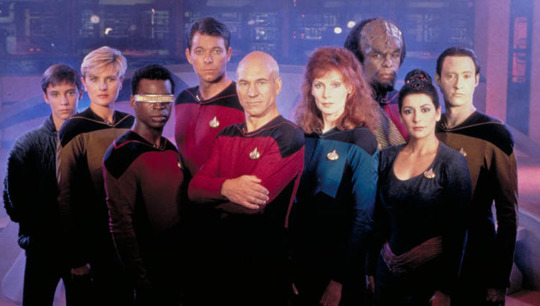
While I don’t want past characters taking up all the screentime, I would like to see more coming back. Season 1 felt odd at times when Picard really should have called on old friends like Geordi, Worf, or Beverly for help, and instead he called on new characters the audience had never seen before. There’s a wealth of past characters to bring here -- the most obvious choices being the rest of TNG’s cast. But there’s also Voyager’s cast, which would work well with Seven of Nine. And we can’t forget Deep Space Nine’s cast! There’s much potential to bring back old characters in new ways, and while the thought does make me nervous, for the most part I respect the decisions made for returning characters and generally trust them with the rest.
More development for Narek.
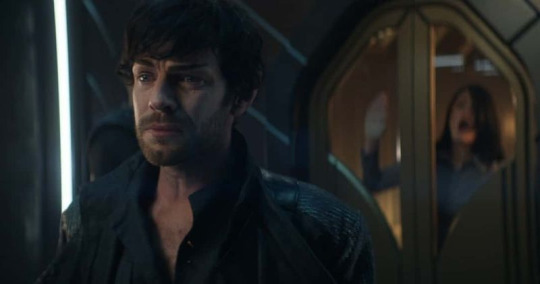
Boy band Romulan here was tragically underdeveloped, only really becoming interesting in the finale when he began playing more of a wild card role. It’s clear there’s much more potential with his character than what they’ve seen, and I’d love to see him continue that unpredictable role with unsure allegiances. Perhaps even a redemption arc? I’m not sure exactly what I want from him, really. Just more than what we’ve been given so far.
More development for Soji.

I don’t think Soji is a bad character. I just think she was sadly underwritten. I can tell you all about what she is, but not who she is. What are her interests? Her motivations? What drives her as a person? I frankly have no idea. The writers have made the mistake of thinking that giving her a mystery is the same as giving her a personality. That needs to be fixed. While it’s easy to pin some of the blame on Isa Briones, I don’t think she’s really a bad actress. She just has so little to work with.
More Elnor.
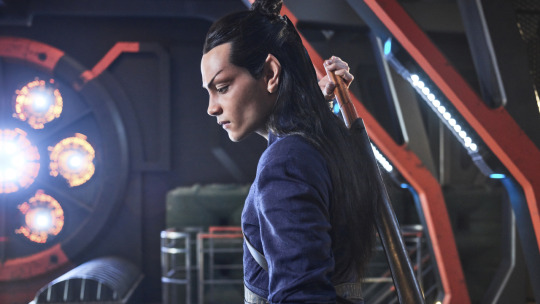
No character in the series is as tragically sidelined as Elnor. After his introduction episode, he essentially tags along for the rest of the plot, watching as the other characters do everything. You could write him out of the series entirely with very little effort. And it makes me sad because he’s a great character! I want to see him take part in driving the plot next season, and focus further on him as a character.
More Seven of Nine.
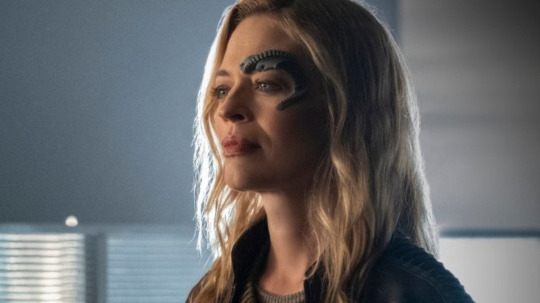
Seven was absolutely fantastic in season 1. It was implied that she’s joining La Sirena’s crew, and I’d love her to be a main character next season. There’s clearly much more to her story to explore, including her guilt at now being a killer. And as I said above, I’d like to see Voyager characters return. Imagine seeing Seven opposite Janeway! Or Tuvok! Or the Doctor! It’d be so good.
More holograms, and hologram rights issues.
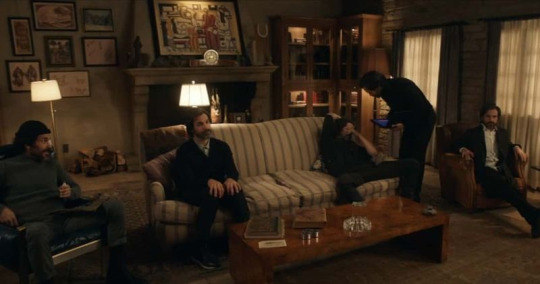
Rios’s holo-squad grew on me a lot as the series progressed, and I’d like to see even more holograms aside from them. This season focused so heavily on android rights, while largely ignoring the same issues in holograms despite the obvious parallels. Voyager started a trajectory of discussing whether holograms were sentient, primarily with the Doctor, and this series is poised to continue that same issue. You could even bring back those very characters, and let the Doctor, Zimmerman, and Barclay chime in on the issue. It’s a plot point ripe for the picking.
Less serialization.
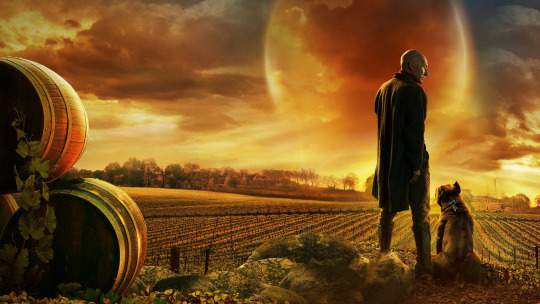
Full serialization is not a bad thing. There are many shows that pull it off near flawlessly. But I don’t think it’s necessarily the right choice for Star Trek. Letting episodes stand on their own to focus on more individualized plots allows for a greater wealth of storytelling and puts the focus primarily on the characters. This season felt a bit unbalanced at times as it tried to tie all the characters and sideplots together into one, but a more episodic approach would largely negate these issues. There should absolutely be a flow between episodes, and perhaps even a build to a grander finale, but overall I think a slightly more segmented style of storytelling would ultimately be the better one.
More Federation nuance.

One of my biggest gripes with season 1 was its portrayal of the Federation. While I do like taking a harder look at the Federation’s mistakes, especially from such a beloved StarFleet officer like Picard, the show did take a pretty sharp turn from showing the Federation as a perfect utopia to showing them as selfish cowards who put fear before compassion. But it’s a complex organization with complex issues. Picard’s conversation with Clancy implied that there were valid political reasons to withdraw from Romulus, even if it wasn’t necessarily the humanitarian thing to do. I would love to see it explored further, without falling so heavily on one side or the other. The Federation is ultimately trying to be a force for good, but it’s certainly a flawed organization that can cause harm if it isn’t careful. Different characters may have very different views of it, and different levels of what nonsense they are willing to tolerate from it. It’s certainly a hard line to balance in storytelling, but it can be done -- Deep Space Nine did it damn near flawlessly. Be more like Deep Space Nine, Picard.
And that’s all I’ve got for now!
If you actually made it all the way down here, thanks for reading <3
#personal#star trek: picard#picard spoilers#star trek#picard#i still need to think further before i can assemble my full thoughts on season 1 tbh#but i can look ahead to season 2 at least
15 notes
·
View notes